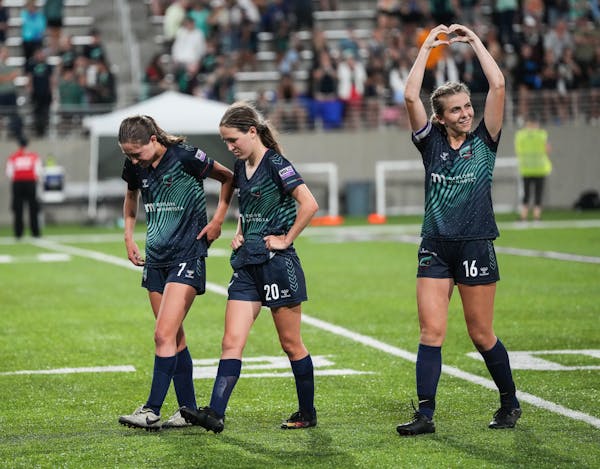No one can accuse Matt Privratsky of overreaching. The co-founder of Minnesota Aurora FC didn't know how the Twin Cities would respond to a new women's soccer team, so he approached its inaugural season with modest ambitions.
"It was as simple as, this club needed to have women coaches, and to not charge players for being on the team,'' Privratsky said. "As it turned out, that vision was incredibly small. I've never been so happy to be so wrong.''
Privratsky could laugh at himself last week, while basking in the afterglow of a season that blew past every expectation. It ended July 23 with a 2-1 overtime loss to South Georgia Tormenta FC in the championship game of the USL W League, in a sold-out TCO Stadium, as a crowd announced at 6,489 watched the Aurora finish with a 13-1-1 record.
The club became an instant hit by nearly every measure, leaving its nine co-founders giddy and a little stunned. The Aurora averaged a league-high 5,626 fans per game, twice increasing stadium capacity to accommodate demand. Media coverage, webstream viewers, volunteers and sponsors all surged higher than anticipated.
Aurora President and co-founder Andrea Yoch said the team will turn a profit in its first year. Merchandise sales ran five times higher than projected, sponsorship revenue was three times higher and ticket sales were more than double what the club estimated.
Internal staff will grow
While the Aurora's on- and off-field success ensured the dreams will be bigger next year, club founders aren't losing sight of their original goals. Yoch said the organization remains "very committed'' to USL W, a pre-professional league that does not pay players, and expects to stay there in 2023. There are no immediate plans to pursue membership in the National Women's Soccer League (NWSL) or the USL Super League, a second-division pro league launching next year.
“The USL W is a great league that matches our mission. Trying to look for another dance partner when we really like the dance partners we have, it just doesn't make any sense”
In the coming months, the Aurora will hire more full-time employees, introduce a mascot at the Minnesota State Fair and plan more community activities. All those tasks will be made a little lighter by an unforgettable first season.
"It was beyond anything we imagined,'' Yoch said. "Our predictions were ridiculously off the mark. There was an appetite for this, and people just gobbled it up. Now it's about, how do we make this sustainable? The opportunity for growth is huge, and we want to make sure we keep doing it right.''
Privratsky called it "heartwarming'' to see the reception the Aurora received. A longtime advocate of women's sports, he envisioned a club that could give athletes and coaches a pathway to pro soccer, as well as an environment that supported and celebrated them.
He and the other eight co-founders thought they could operate the team with the help of some part-timers and volunteers. They did not expect to work without respite for the past 14 months, juggling Aurora duties with their full-time jobs, to satisfy the demand.
Team merchandise sold out quickly and had to be reordered. The club hired extra people to help with sales and stadium operations. Even in a challenging labor environment, the Aurora had no problem filling positions.
"The creation of this team resonated with a lot of talented people,'' Yoch said. "They wanted to be part of what we were building.''
Since the Aurora has no player payroll, Yoch noted it was easier to run a profitable franchise from the start. Still, she said, revenue grew quickly and breezed past the club's low initial targets.
That revenue helped cover costs, allowing the Aurora to preserve much of the $1 million it raised last year by selling shares of the team in a community ownership model. When it did dip into those initial funds, it used them in ways that contributed to on-field success. The Aurora rented two houses for the players to live in, which built team bonds. While many opponents bused to road matches on game day, the Aurora paid for hotels so the club could arrive the day before.
NWSL can wait
According to an ESPN report last month, valuations of NWSL franchises have soared, and the league is planning to add two teams in 2024. Commissioner Jessica Berman told the network more than 30 potential ownership groups are interested. Yoch said moving up to the pro level is not a priority for the Aurora right now.
"The USL W is a great league that matches our mission,'' she said. "Trying to look for another dance partner when we really like the dance partners we have, it just doesn't make any sense.''
Privratsky said job one during the offseason is to hire a full-time team president and other key staff. Club officials will consider ways to enhance the game-day environment, and Yoch said they already are trying to add more seating at TCO Stadium. The Aurora also wants to do more community events, such as clinics, which Yoch called a major part of the team's identity.
With the next games many months away, Yoch and Privratsky might even get some rest. But probably not much.
"In the long term, our group has a lot of ambitious goals,'' Privratsky said. "We've proved the concept. Now it's about getting established and building something sustainable.
"To have the first season go this well is really fulfilling. It confirms what can happen when you invest time, money and energy into women's sports.''




![Minnesota United midfielder Kevin Molino (7) celebrates a goal with teammates in the second half. ] LEILA NAVIDI ¥ leila.navidi@startribune.com B](https://arc.stimg.co/startribunemedia/PCCF3GSF3AB7SUUNNWZXCA3SHE.jpg?w=75&h=75&fit=crop&crop=faces)
